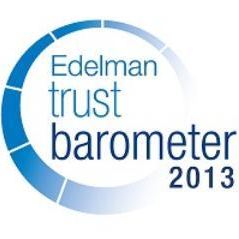 Fascinating to read the latest global ‘Trust Barometer 2013’ survey findings from Edelman, which examines the extent to which organisations and governments are trusted by the public. This has some far-reaching implications for the way we communicate with our audiences, and great insights into how trust can best be built (and destroyed).
Fascinating to read the latest global ‘Trust Barometer 2013’ survey findings from Edelman, which examines the extent to which organisations and governments are trusted by the public. This has some far-reaching implications for the way we communicate with our audiences, and great insights into how trust can best be built (and destroyed).
In general terms, trust at a global level has increased since the 2012 survey, notably being driven by increases in Germany, France, the UK and the US (all of whom suffered widespread distrust, linked to economic and other significant events)
Here is a summary of the most interesting findings:
- Trust in the government and in the media has risen since a year ago, although levels of trust in both show significant scope for improvement
- NGOs (non-government organisations) are the most trusted bodies, with government the least trusted; business and the media sit between these
- Corruption and/or fraud is a key reason for distrust in business and government, with incompetence a key factor in government
- By sector, whilst technology and automotive companies are the most trusted, financial services and banks are the least trusted
- Companies headquartered in Canda, Germany, Sweden and Switzerland are seen as the most trustworthy, but those based in Mexico, India, China and Russia are seen as the least trustworthy
- Small businesses are trusted the most in the West, while big businesses are trusted more in emerging economies
- The majority of people need to hear company information 3-5 times to believe the messaging communicated
- The survey findings describe a ‘crisis of leadership’, whereby academics, technical experts and ordinary people are trusted more than company CEOs or government officials/regulators
- Business and government leaders are seen as weakest for telling the truth and for making ethical and moral decisions; there remains a significant gap between the overall level of trust in organisations and government (higher) and the trust in their respective leaders to tell the truth (lower)
So what can organisations do to combat these perceptions? The insights from the survey reveal sixteen attributes which are key to building trust; these are themed around five key areas:
- Engagement- listening to customers’ needs, treating employees well, placing customers ahead of profits and communicating frequently and honestly on the state of its business
- Integrity – ethical business practices, taking responsible actions to issues/crisis mangement, transparent & open business practices
- Products & Services – offering high quality products and services, innovation and ideas
- Purpose – working to protect and improve the environment, addressing society’s needs in everyday business, creating programmes to positively impact local communities, partners with governments, NGOs and third parties to address society’s needs
- Operations – highly regarded and widely admired leadership, ranking on top global companies list, delivers consistent financial returns to investors
Many of the implications from this study point to a much more ‘inclusive’ management style, a flexible approach, the creation of dialogue and the empowerment of customers and employees in this process.
The Sharepoint-based full deck of slides from the study can be found here.
What do you think about these findings and what do you think organisations can do to strengthen their position?



